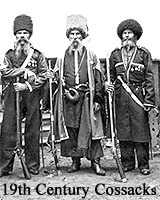• Cossack •
Pronunciation: kah-sêk • Hear it!
Part of Speech: Noun, proper
Meaning: 1. A member of one of the peoples settled in Ukraine, southern Russia, and the Ural Mountains. They were originally made up of outlaws and refugees from religious persecution and feudalism that was spreading throughout Russia. 2. A member of a Cossack military unit used in imperial Russia to break up strikes. Their regiment survives today; it served security duty at the 2014 Sochi winter Olympics.
Notes:  This lexical orphan identifies the ancestors of modern day Ukrainians. They formed quasi-states, calling themselves the Don Cossacks, the Zaporozhian ("beyond the rapids [of the Dnepr]) Cossacks, and 19 others. By the 16th century their hetman "leaders, elders" met in a sech each spring after planting to decide battle plans for the summer.
This lexical orphan identifies the ancestors of modern day Ukrainians. They formed quasi-states, calling themselves the Don Cossacks, the Zaporozhian ("beyond the rapids [of the Dnepr]) Cossacks, and 19 others. By the 16th century their hetman "leaders, elders" met in a sech each spring after planting to decide battle plans for the summer.
In Play: The Cossacks were known as excellent horsemen and fighters. Since some stood between Russia and Poland and Russia and Turkey, in the 19th century Russia began paying them a stipend to defend Russia from Poland to the east and Turks from the south. Their battles with Poles and Turks became legendary.
Word History: Russian peasants fleeing serfdom were the majority of Cossacks. They took their name from the Turkic people fleeing Kazakhstan to what is today Ukraine. Old Turkic qazaq meant "adventurer, nomad", source also of the Kazakh in Kazakhstan. The Cossack hosts (voiska) were firm believers in Eastern Orthodoxy, so they hated Poles, who were Catholic and Turks, who were Muslim. Cossacks became supporters of the tsar since his position was so intertwined with the Russian Orthodox Church. October 14 was established by presidential decree in 1999 as Ukrainian Cossacks Day, a legal holiday.
P.S. - Register for the Daily Good Word E-Mail! - You can get our daily Good Word sent directly to you via e-mail in either HTML or Text format. Go to our Registration Page to sign up today!




